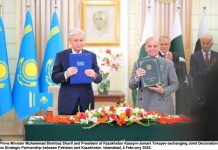By Qamar Bashir
During my close association with various governments, including those of PML (N), PPP, martial law regimes, and PTI, I observed a troubling pattern among ruling parties. These parties tend to treat the opposition as adversaries, countering every move, rhetoric, and narrative put forth by opposition parties. This approach is highly counterproductive for the government, as it escalates tension, increases political temperature, creates uncertainty, and heightens anxiety and worries among the populace. Such a scenario ultimately undermines the government while benefiting the opposition. Governments conveniently forget that engaging constructively with the opposition tends to result in more stable and productive governance, while adversarial approaches often lead to political gridlock and inefficiency.
Presently, the power chessboard laid out in the country reflects an interesting positioning. The government, the establishment, the parliament, and the Election Commission are aligned. They also have on their side co-opted traditional media and gagged social media, whereas PTI, the people, and the judiciary seem to be on the other side of the table.
This layout suggests that the government has at its disposal the weapons of the state’s brute power, which it is using to intimidate, harass, and control opposition leaders, their activists, and their most trusted mouthpiece, social media. It is armed with legislative tools, which it is using aggressively. For example, it is delaying and sabotaging the constitution of election tribunals and making amendments to the Election Act 2023 to frustrate the majority judgment of the Supreme Court. Additionally, the Election Commission turned PTI’s victory based on form 45 into a defeat using form 47.
In this scenario, though the opposition does not have a kinetically equipped institution, it is still proving to be an equal match to the government. Despite its hands being tied, its leadership incarcerated, and state power fully unleashed to obliterate the party, the opposition remains resilient.
The big question is why the opposition, seemingly without power pieces, is proving to be a formidable opponent. Perhaps it is due to the strategic use of pawns, which, when moved cleverly, can trump even the most powerful pieces like the queen or the king. We have seen the power of the pawns during the military coup in Turkey when fighter jets, guns, and tanks were rendered ineffective. Similarly, in Bangladesh, pawns defeated the highly entrenched government, forcing the queen to flee the country in total disgrace instead of resigning and staying to defend her honor and dignity or even laying down her life rather than abandoning her own motherland.
This perceived nexus may be altogether untrue and built upon the wildest imagination, not grounded in facts. However, it remains a matter of great concern for the state, minus the judiciary, which the government claims supports the opposition. The opposition nexus of PTI, the judiciary, and the people is a potent combination and resonates well with PTI’s main notion of equal justice for the people.
The reason behind the impression of these two nexuses is a big question mark. The government and the establishment should seriously consider turning the tables. This can be achieved by repositioning the government in direct opposition to its current approach. It should transform its perception from hiding behind the state’s brute power, the power of the parliament, or the nuisance of the Election Commission, to standing with justice and the people of Pakistan. The government should realize that once the people rise against it, all those towing the government’s boat will disappear, letting it sink into total misery.
Ceasing to react and oppose every move made by the opposition, and refraining from counter-blame and hurling accusations, would be a constructive step. For example, instead of countering the opposition’s criticism of government policies with past comparisons, the government should acknowledge the issues, empathize with the people, and highlight its strategies to address these challenges.
To start with, the government should abandon its belligerent posture and hawkish approach. Being in power should mean demonstrating humility, forgiveness, benevolence, and consideration. It should stop reacting to and opposing every move made by the opposition, and refrain from counter-blame, touting, and hurling accusations.
For example, in response to the opposition’s criticism of government policies and lack of good governance, such as “high inflation,” higher electricity costs, exorbitant prices of essential kitchen items, higher unemployment rates, and other such allegations, the government often counters by arguing that inflation was even higher during the opposition party’s tenure or that inflation was much lower during their previous term in power. Instead, the government should acknowledge the unprecedented inflation, express empathy with the people of the country, and highlight its strategies, plans, and efforts to control inflation. It should invite all opposition parties for dialogue and take them into confidence regarding the government’s efforts to address the issues and challenges faced by the people.
The government should also avoid giving knee-jerk reactions to every political move made by the opposition. It is a proven strategy of the opposition to counter every move the government makes, aiming to unnerve the government and provoke knee-jerk reactions that lead to mistakes and errors. The opposition will gladly seize upon these lapses, amplify them, and increase their impact by isolating slips of the tongue, wrong phrases, or mistakes from their context.
The government in general, and the establishment in particular, should desist from holding counter press conferences to bash and name-call the opposition. This is exactly what the opposition wants and thrives on. Soon after the conference, all phrases and sentences that suit the opposition’s narratives will be clipped, given added value, and presented in the most sensational contexts across all forms of media, both traditional and social. A new round of bashing on the government, and especially on the establishment, will then begin, eroding the political capital of the government and conversely increasing the political capital of the opposition.
In this scenario, the ideal approach for the government and establishment would be to adopt a more collaborative and less confrontational stance, focusing on governance and addressing the people’s concerns rather than engaging in constant political warfare.
By Qamar Bashir
Former Press Secretary to the President
Former Press Minister to the Embassy of Pakistan to France
Former MD, SRBC, CEO, ATV

















